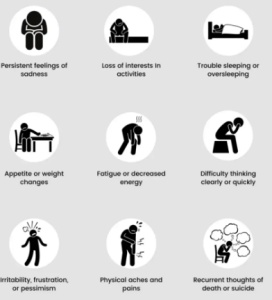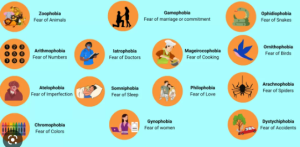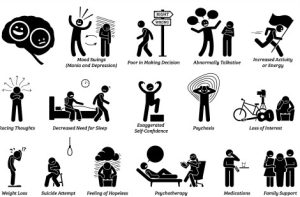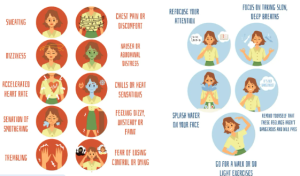Mental health has never been a bigger talking point. But just because more people are aware of mental health conditions doesn’t make suffering from one – or knowing someone that does – less overwhelming.
Some of the most common mental health issues are as follow:
Anxiety

Anxiety problems are some of the most common mental health problems. Although it is difficult to predict exactly how many people suffer from anxiety, as it manifests in many different forms, Time to Change estimates than in any given week around six in every 100 of us will be experiencing Generalised Anxiety Disorder (a common type of anxiety problem).
Meanwhile around 8 out of 100 people will be experiencing a mixture of anxiety and depression.
Feeling anxious is a normal emotion that everyone will experience at some point, but anxiety becomes a mental health problem when someone finds they are feeling this way all or most of the time.
It is difficult to pinpoint the symptoms of anxiety because those suffering could have differing experiences, but experts suggest often those who experience problems with anxiety describe life in general becoming exhausting, as the worry and fear associated with different situations takes so much energy to overcome.
anxiety becomes a mental health problem when someone finds they are feeling this way all or most of the time
Sufferers may also find it hard to relax, sleep and eat and could avoid certain situations, work or new and unfamiliar experiences.
A lot of people with anxiety problems will experience physical symptoms, too, including aches and pains, difficulty breathing, increased heart rate, feeling sick or dizzy and blurry vision.
Depression
Experts describe depression as a low mood that lasts for a long time, and affects your everyday life.
“In its mildest form, depression can mean just being in low spirits,” the site explains. “It doesn’t stop you leading your normal life but makes everything harder to do and seem less worthwhile.”
But at its most severe, depression can be life-threatening because it can make you feel suicidal.
Some of the symptoms of depression include feeling down, upset or tearful, empty and numb, isolated and unable to relate to other people, lacking in confidence and self-esteem and feeling hopeless.
T Here are also some specific forms of depression including:
Here are also some specific forms of depression including:
Seasonal affective disorder (SAD) – depression that occurs at a particular time of year, or during a particular season.
Dysthymia – continuous mild depression that lasts for two years or more. It is also referred to as persistent depressive disorder or chronic depression.
Prenatal depression – depression that occurs during pregnancy.
Postnatal depression (PND) – depression that occurs in the weeks and months after becoming a parent. Though postnatal depression is usually diagnosed in women, it can also affect men.
Phobias

A phobia is described by experts as an overwhelming and debilitating fear of an object, place, situation, feeling or animal.
They are a common type of mental health issue impacting 2.4 people in every 100.
If a phobia sufferer doesn’t come into contact with the source of their problem very often it may not affect their life – although in some cases even thinking about the thing they fear can give a person “anticipatory anxiety”.
If a phobia becomes very severe, the person suffering may organise their life around avoiding the aspect that’s causing distress.
Bipolar disorder

Doctors describe bipolar disorder as a diagnosis given to someone who experiences extreme periods of low (depressed) and high (manic) moods.
Bipolar is the fourth most-common mental health problem worldwide after depression, anxiety and schizophrenia with recent statistics revealing one in every 100 people will be diagnosed with the condition at some point in their life.
While all of us will have variations in our mood, those for those suffering from bipolar disorder the changes can be very distressing and have a big impact on their life.
Psychiatrists say high or ‘manic’ periods can involve people feeling euphoric, excited, confident, ambitious or adventurous, a feeling of being invincible, but can also include not feeling like eating or sleeping.
Meanwhile low periods can share a lot of the characteristics of depression including feeling down, hopeless or tearful, experiencing low self esteem and having a lack of motivation and inability to enjoy things.
Panic disorder

Statistics have revealed one in about every 200 people will experience a panic disorder.
The NHS says panic disorder is an anxiety disorder where you regularly have sudden attacks of panic or fear.
“Everyone experiences feelings of anxiety and panic at certain times,” the site explains. “It’s a natural response to stressful or dangerous situations.
Post Traumatic Stress Disorder is a type of anxiety disorder which could develop after being involved in, or witnessing, traumatic events
“But for someone with panic disorder, feelings of anxiety, stress and panic occur regularly and at any time, often for no apparent reason.”
A panic attack therefore occurs when these feelings of anxiety become intense and overwhelming.
Physical symptoms of a panic attack can include shortness of breath, sweating, an increased heartbeat or blurry vision.
Although panic attacks are frightening, the NHS say they’re not usually dangerous. “An attack won’t cause you any physical harm, and it’s unlikely that you’ll be admitted to hospital if you have one,” the site explains.
Post Traumatic Stress Disorder
According to Mind Post Traumatic Stress Disorder (PTSD) affects around four in every 100 people.
The mental health charity describes the condition as a type of anxiety disorder which could develop after being involved in, or witnessing, traumatic events.
Symptoms can include being hyper-vigilant at all times or being unable to relax; avoiding talking about the trauma and numbing yourself to emotions. Sufferers can also experience flashbacks and nightmares.


